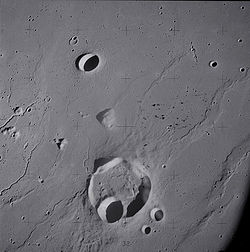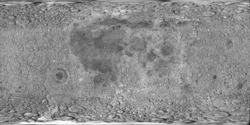Van Biesbroeck (kráter)
| Kráter Van Biesbroeck | |
|---|---|
 Kráter Van Biesbroeck (na spodním okraji většího kráteru Krieger) | |
| Souřadnice na Měsíci | |
| Selenografická šířka | 28,7° S |
| Selenografická délka | 45,6° Z |
| Další údaje | |
| Průměr kráteru | 10 km [1] |
| Hloubka | ? km |
| Colongitudo | 46° |
| Eponym | George Van Biesbroeck |
Van Biesbroeck je malý impaktní kráter miskovitého tvaru nacházející se ve východní části měsíčního moře Oceanus Procellarum (Oceán bouří) na přivrácené straně Měsíce. Má průměr 10 km, jeho dno postrádá centrální pahorek. Než jej v roce 1976 Mezinárodní astronomická unie pojmenovala na současný název, nesl označení Krieger B.[1]
Van Biesbroeck leží na jižní části okrajového valu většího kráteru Krieger, který má lávou zatopené dno. Východně lze nalézt malé kráterové jamky Rocco a Ruth. Severozápadně leží kráter Wollaston, západo-jihozápadně Toscanelli a východo-severovýchodně Angström. Západně a jižně se táhne síť brázd Rimae Aristarchus a severozápadně směrem ke kráteru Wollaston brázda Rima Krieger.[1]
Název
Pojmenován je podle amerického astronoma belgického původu George Van Biesbroecka.[2][1]
Odkazy
Reference
Literatura
- RÜKL, Antonín. Atlas Měsíce. Praha: Aventinum, 1991. ISBN 80-85277-10-7.
Externí odkazy
 Obrázky, zvuky či videa k tématu Van Biesbroeck na Wikimedia Commons
Obrázky, zvuky či videa k tématu Van Biesbroeck na Wikimedia Commons - Kráter Van Biesbroeck, Wikispaces.com (anglicky)
- LAC 39, mapa 1:1 000 000 (Lambertova projekce)
Média použitá na této stránce
cylindrical map projection of the Moon. The Moon's whole surface was mapped by the Clementine spacecraft in 1994, here North is at the top. The dark floor of crater Plato is at the middle top above Mare Imbrium, while the bright floor and rays of crater Tycho is near the middle bottom below Mare Imbrium. Mare Procellarum is at the near left, and Mare Tranquillitatis is just right of centre and Mare Crisium is at the near right. The far left and far right show the contrast of the mostly cratered farside with small isolated mare.
Crater Krieger (detail of LRO - WAC global moon mosaic)
Apollo 15 Hasselblad image from film magazine 90/PP. The crater in the bottom center is Krieger, with Van Biesbroeck laid across the southern rim. The smaller craters to the southeast of Krieger are Rocco (5 km) and Ruth (3 km). In the upper left quadrant is the bowl-shaped Wollaston crater. Note the wrinkle-ridges on the mare, as well as the sinuous rilles along the left edge.
This is figure 3-44 of the Apollo 15 Preliminary Science Report (NASA SP-289, 1972), which has the following caption:
- View northwestward across the Ocean of Storms at the north margin of the Aristarchus Plateau. Krieger Crater, near the lower edge of the photograph, has a rim broken in two places. Krieger B, approximately one-fifth the diameter of the larger crater, is centered just inside the rim at one point. A prominent rille appears to emerge from the other break. Wollaston is the large, raised-rim crater in the upper left quadrant of the photograph. The similar orientation of mare ridges in the upper right quadrant and the ridges and rilles in the lower left quadrant are noteworthy.




